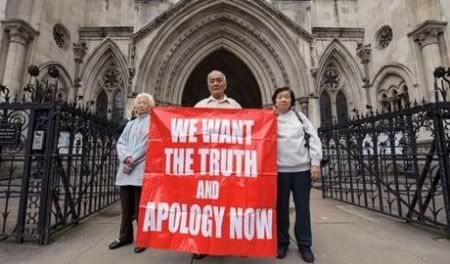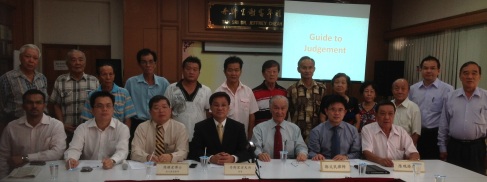4 September 2012 from Bindsman LLP
To read the Judgment click here
The quotes below are taken direct from the Court’s detailed judgement:
Responsibility for the troops, their orders and the killings
• “On 11 and 12 December 1948 a patrol of the Second Battalion of the Scots Guards… shot and killed 24 civilians at Batang Kali” (officials had maintained at the time that those killed were “bandits” or “terrorists”) – para 1 of the judgment;
• The Scots Guards were deployed to Malaya directly from the UK following an exchange of “secret” memos which warned “unless the enemy is rapidly defeated, there will be a loss of prestige and prosperity from the first of which the British may never recover in South East Asia and from the second of which the county would take a very long time to recover” – para 22;
• Defending his position in the case, “the Foreign Secretary contended that as they were sent to assist with internal security and as the insurgency was not an external attack, the legal responsibility for the actions of the Scots Guards was that of the Federation of Malaya alone or jointly with the Ruler of Selangor” – para 26
• Despite there being “no legal duty to establish an inquiry” in the view of the Court because European Court of Human Rights case law conflicted with what they considered to be binding decisions of the House of Lords, it was still “necessary to consider the further argument of the Secretaries of State that… the British Government had no legal responsibility for the actions of the Scots Guards at Batang Kali” – para 106;
• “It is clear, in our view, that the British Government had command and control over the Scots Guards. First, the Scots Guards were part of the British Army in contradistinction to the Malay Regiment and other local forces. Second, it is evident from the minute of the British Cabinet set out at paragraph 22… that the reason for the decision to send the Brigade of the British Army was to defend British interests against the advance of communism on what was in reality territory the British government controlled, to prevent the deaths of British citizens and to protect its economic interests. Third, control over the deployment of the army in Malaya was vested in British Defence Co-ordination Committee Far East… Fourth, the Scots Guards were paid for by the British Government, not by the Federation or the Ruler of Selangor. Fifth, it is clear from the role played by Major General Sir Charles Boucher in relation to the investigation in 1948 that his command was in charge of the Scots Guards” – para 112;
• “[G]iven that what is in issue is the actions of the Scots Guards in shooting civilians, on ordinary principles those responsible for the command of the troops who did the shooting, ultimately the Army Council, have the responsibility for their actions. The Guards were trained by the British Army and under its direct command” – para 115 – “we cannot accept the [Secretaries of State’s] submission that the ultimate source of the authority and legal powers was either the Ruler of Selangor or the High Commissioner acting on behalf of the Federation of Malaya” – para 119;
• Of the troops deployed “[m]ost were national servicemen and they had had only limited training for this kind of operation” – para 24;
• The patrol deployed to Batang Kali was led by a 22 year old, Lance Sergeant Charles Douglas, as “there was no officer available to lead it” – para 28;
What happened at Batang Kali
• “There is no evidence, 63 years later, on which any of the 10 key facts relating to what happened at Batang Kali can seriously be disputed” – para 29 (yet the Secretaries of State had maintained in their decisions on whether to undertake a public inquiry and at the hearing it was impossible to reach any meaningful conclusions about what had happened at Batang Kali);
• The 10 key facts included that “Batang Kali was a village on a rubber plantation, inhabited by families. They did not wear uniforms, had no weapons and were a range of ages” – para 29 i) (the Court also noted that “[o]n 22 December 1948, the Owner of the Estate which included Batang Kali, Mr Menzies, made a public statement that those killed had been loyal employees with a record of good conduct” – para 33);
• “On the way to the village the patrol pursued two uniformed armed insurgents, but lost them”- para 29 ii);
• “A young man was shot dead by the patrol in the village on the evening of 11 December 1948; he was said to be Loh Kit Lin” – para 29 iv) (Mr Loh was an unarmed student, shot in the stomach then executed from close range as he writhed on the ground);
• “The inhabitants were separated by the patrol as between (1) men and (2) women and children. They were detained in custody in the village” – para 29 iv);
• “Interrogation of the inhabitants took place. There were simulated executions to frighten them, causing trauma” – para 29 v);
• “The police officers secured information from one of the males, Cheung Hung, about armed insurgents who occasionally visited the village to obtain food supplies. This information was passed to the patrol” – para 29 vi);
• “A lorry arrived in the morning. It was searched. The kepala (headman) was detained. Rice was found” – para 29 vii);
• “The women and children and one traumatised man were loaded onto the lorry. It was driven a little way. They were guarded by members of the patrol before being driven back to their village” – para 29 viii);
• “The hut with 23 men was unlocked. Within minutes all of the 23 men were dead as a result of being shot by the patrol” – para 29 ix);
• “The inhabitants’ huts were then burned down and the patrol returned to its base” – para 29 x);
Why it happened
• As to why this happened the “official explanation given in 1948-9 is that the person (Loh Kit Lin) was shot on the night of 11 December when trying to escape. On 12 December the other 23 men were taken out of a hut to be taken back to base for interrogation. One shouted, they split into three groups and there was an escape attempt. Warnings were shouted at them. When the men did not stop they were shot dead” – para 30 – but “[ i ]t can no longer be permissible to conclude, in our view, on the evidence available at the present time which was before the court, that the 24 men were shot when trying to escape” – para 142;
• In 1970 Metropolitan Police investigation was initiated by DCS Frank Williams. He interviewed a number of the Scotts Guards who could be traced, the majority of whom (Mr Cootes, Mr Alan Tuppen, Mr Robert Brownrigg, Mr George Kydd and D K Wood) admitted that the killings were murders – para 57;
• Their statements are amongst the “evidence that supports a deliberate execution of the 24 civilians at Batang Kali” – paragraph 138 – though there is also some “evidence that supports the account that the 24 men were shot whilst trying to escape” – para 139 – “in approaching the evidence as to whether there was a deliberate execution of the men or the men were shot when trying to escape from lawful custody, there is a conflict of evidence. It can no longer be permissible to conclude, in our view, on the evidence available at the present time which was before the court, that the 24 men were shot when trying to escape. Nor can the conclusion now be reached that that the 24 men were deliberately executed. There is evidence that supports both accounts” – para 142;
Failed past investigations
• “Although there are no papers extant in relation to the inquiry by Sir Stafford Foster-Sutton in 1948-9 [on which the official account was based], apart from the statements of the two police officers and Cheung Hung to which we have referred at paragraph 36.i) above, it is clear that the inquiry had very serious weaknesses. There do not appear to have been any post mortems or other examination of the bodies; no evidence was taken from the Estate Owner. The attitude taken by Sir Stafford to the inhabitants of the village, as set out in paragraph35.i) above cannot be justified. That attitude and the failure to take evidence from inhabitants significantly undermines the objectivity of the inquiry. As we have set out at paragraph 143 the inquiry also has the substantial weakness that it does not appear to have considered whether the killing of each of the men was a proportionate and reasonable use of force in the circumstances, even though as we have set out at paragraphs 33 and 40 the issue was raised at the time” – para 147;
• “The possibility of a conclusion by an inquiry that there was a cover-up by the British officials of the Government of the Federation of Malaya in 1948 cannot be dismissed” – para 152;
• “The allegation of cover-up in relation to the 1948/9 inquiry relates much more significantly to the position of the British Army and Scots Guards in particular. That is the essence of the allegations made in 1970 by the Guardsmen who say there was a deliberate execution of the men and it was “covered up” by the Scots Guards and British Army. This is a very serious allegation though one which can properly be made on the evidence” – para 153;
• “On 30 July 1970, a detailed report was submitted by Detective Chief Superintendent Williams to the Commissioner of Police for the Metropolis. In it he expressed the view: ‘At the outset this matter was politically flavoured and it is patently clear that the decision to terminate enquiries in the middle of the investigation was due to a political change in view when the new Conservative Government came into office after the General Election on 18 June 1970’” – para 67;
• “As is evident from what Detective Chief Superintendent Williams had achieved, at that stage it would have been possible to carry out a detailed factual inquiry, as, even though much of the 1948-9 work had been destroyed, most of those who could give evidence were still alive” – para 150 – but this did not occur, a decision which was “much more difficult to justify” than that to abandon the police investigation – para 155;
• In 1993 a Royal Malaysian Police investigation began and sought the assistance of the UK government, but “[ i ]t is clear from internal British Government memoranda that there was seen to be no reason to provide rapid assistance to the Royal Malaysian Police inquiry. Sometime during 1994 the Royal Malaysian Police made a request for help, but it is evident that it was considered not to be in the interests of the British Government to progress that request with any speed” – para 77 – “the Royal Malaysian Police obtained virtually no assistance from the United Kingdom authorities” – para 79.
To read the Judgment click here
Filed under: Uncategorized | Leave a comment »






